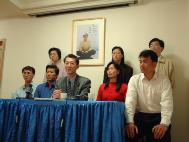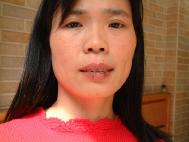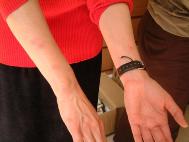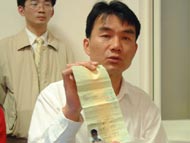Taiwanese Falun Gong Practitioners Protest Deportation by Hong Kong Government (Photo)
(Clearwisdom.net) While the protests triggered by Hong Kong's Article 23 legislations have not yet subsided, on February 21, the Hong Kong government deported nearly 80 Taiwanese who held legitimate travel documents to visit Hong Kong, for so-called security reasons. This act deepened the concerns of people from all walks of life over Beijing's increasing control of Hong Kong.
Some of the Falun Gong practitioners who were forcibly deported to Taiwan at a press conference. Above row: Left Chen Meiya, center Chen Lizhu, right Chen Daokang; front rom: from left, Yang Kunmao, Zhang Zhenyu, University of Taiwan politics Department Professor Ming Ju Zheng (host), Lu Liping, Caishouren.
Professor Ming Ju Zheng, Dean of the Political Science Department of National University of Taiwan, hosted the press conference on February 22. He indicated that more than 400 Falun Gong practitioners with legitimate visas went to Hong Kong to attend an experience sharing conference. Unexpectedly, 80 of them were detained or deported. At least nine of them were treated with violence. At least 18 people were denied contact with the outside. Regarding this, the Taiwan Falun Dafa Society expressed their solemn protest at a press conference on the morning of February 22 in Taiwan. The deported Falun Gong practitioners gave first-person accounts of the situation and called upon the Hong Kong government to maintain freedom and Hong Kong laws and not become the Chinese Communist Party's tool in abusing human rights.
Seven Falun Gong practitioners described the illegal treatment they had received. They indicated they were unable to accept Hong Kong government's brutal and illegitimate conduct. These practitioners were Zhang Zhen Yu, Yang Kun Mao, Chen Dao Kang, Lu Liping, Cai Shou Ren, Lizhu, and Chen Mei Ya.
Nearly all of them suffered from the same poor treatment: they were held under force, their bodies searched, baggage inspected, communication and personal freedom restricted. They even were wrapped by a blanket that was used to hold violent criminals and were taken to airplanes by police forcibly. Miss Lu Liqing showed reporters bruises on her body. According to her description, the flight attendant almost cried when she saw how she was treated. She said that she had never seen such police brutality in the many years she had worked there, not even to convicted murderers. She expressed her tremendous disappointment in the Hong Kong government.
Professor Ming Juzheng described the Hong Kong police's view, "We all understand that you are the good people, but the upper levels gave orders and our pressure is huge." Mr. Zhang Zhenyu indicated that the police even came to him to apologize because they also were obeying orders from higher levels. Nearly all seven members felt that the law enforcement police officer suffered pressures from "above," but above's above also has an above. Because the police did not propose any legitimate reason, one police officer, Feng Bauhaus, repatriated these good people for so-called security reasons. Therefore they extrapolated that the Hong Kong government must have suffered pressure from Beijing to repatriate these Falun Gong practitioners.
Several practitioners indicated that they spent money to purchase airplane tickets, and they held legitimate passports and visas, but the Hong Kong government unexpectedly violated their rights and interests and ended their Hong Kong trip. Only dictatorships could do things like this, but this unexpectedly happened in the Eastern Pearl, Hong Kong. It really made people worry about the Hong Kong people's future. The individuals involved did not remove the possibility of taking legal action against the Hong Kong government.
According to Falun Gong practitioner Hong Ji Hong, the visa applications of several dozen Falun Gong practitioners were rejected. He himself was one example. However, none of them had criminal records, nor was there any evidence that they had violated security. Therefore he thought Hong Kong's administrative neutrality had already received pressure from the Chinese government. This time the repatriation case was only the tip of the iceberg.
Professor Ming Ju Zheng indicated that, by noon on February 22, there were still 20 practitioners delayed at the airport without food and rest. Presently the Committee of Mainland Affairs is trying urgent rescue efforts.
From Hong Kong, the Hong Kong government made the first response on the evening of February 22, saying that the concerned personnel had always processed cases like this with reason and legitimate restraint. Kan Hung-cheung was extremely unhappy and deemed this event would seriously affect the prestige of Hong Kong.
Kan Hung-cheung stated that it was totally unreasonable and without any basis that the Hong Kong government refused to let several dozen Taiwan Falun Gong practitioners enter Hong Kong. This event reflected that the Hong Kong government received pressure from the Chinese government in Beijing. He said, "All the Falun Gong experience sharing conferences are peacefully conducted, but the special zone government detained several dozen Taiwanese Falun Gong practitioners at the forbidden area of Hong Kong International Airport, and forcefully deported them back to Taiwan, causing bodily damage to some practitioners. This is quite upsetting. Hong Kong's prestige will surely suffer." Kan Hung-cheung disclosed that they had originally invited 800 people from more than 20 countries to attend the conference.
According to Central News Agency news, besides Taiwanese Falun Gong practitioners, some practitioners from Japan and Thailand were also refused entry into Hong Kong, and the authorities deported some. Kan Hung-cheung hoped that the Hong Kong government handles the matter following the law and not submit to Mainland China's pressure.



